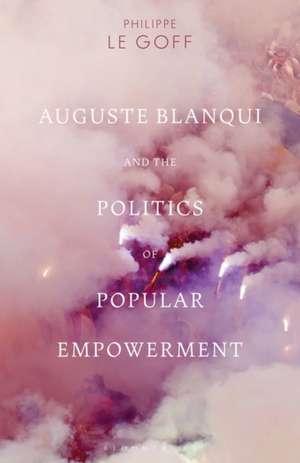Auguste Blanqui and the Politics of Popular Empowerment
Autor Philippe Le Goffen Limba Engleză Hardback – 19 feb 2020
| Toate formatele și edițiile | Preț | Express |
|---|---|---|
| Paperback (1) | 198.68 lei 6-8 săpt. | +48.95 lei 7-13 zile |
| Bloomsbury Publishing – 26 ian 2022 | 198.68 lei 6-8 săpt. | +48.95 lei 7-13 zile |
| Hardback (1) | 599.10 lei 6-8 săpt. | |
| Bloomsbury Publishing – 19 feb 2020 | 599.10 lei 6-8 săpt. |
Preț: 599.10 lei
Preț vechi: 765.59 lei
-22% Nou
Puncte Express: 899
Preț estimativ în valută:
114.63€ • 119.69$ • 94.88£
114.63€ • 119.69$ • 94.88£
Carte tipărită la comandă
Livrare economică 04-18 aprilie
Preluare comenzi: 021 569.72.76
Specificații
ISBN-13: 9781350076792
ISBN-10: 1350076791
Pagini: 272
Dimensiuni: 156 x 234 mm
Greutate: 0.56 kg
Editura: Bloomsbury Publishing
Colecția Bloomsbury Academic
Locul publicării:London, United Kingdom
ISBN-10: 1350076791
Pagini: 272
Dimensiuni: 156 x 234 mm
Greutate: 0.56 kg
Editura: Bloomsbury Publishing
Colecția Bloomsbury Academic
Locul publicării:London, United Kingdom
Caracteristici
Sources used include a range of Blanqui's well-known and lesser-known texts, some of which have only recently been translated into English for the first time
Notă biografică
Philippe Le Goff teaches at the School of Modern Languages and Cultures, University of Warwick, UK. He is the co-editor, with Peter Hallward, of The Blanqui Reader (2018).
Cuprins
Abbreviations Acknowledgments Introduction Chapter 1. Intelligence Chapter 2. Conflict Chapter 3. Actors Chapter 4. Volition Chapter 5. History Conclusion Bibliography Index
Recenzii
When it comes to revolutionaries asking the right questions today, there is great value in returning to Blanqui. And Philippe Le Goff's work is a welcome guide to this remarkable figure.
For the Marxist political movements which rose to prominence after his death, Blanqui came to symbolize a conspiratorial mode of elitist politics left behind by mass working class organizations, and he has remained excluded from the socialist canon ever since. Le Goff bucks this trend, reclaiming Blanqui as a thinker of the ever-possible work of organizing popular empowerment ... Auguste Blanqui and the Politics of Popular Empowerment illuminate[s] the key practical and theoretical challenges facing a twenty-first century socialist politics.
Le Goff's exposition of Blanqui's ideas is clear and compelling.
Karl Marx had much admiration for Auguste Blanqui, whose name he considered as synonymous with revolutionary socialism, and Walter Benjamin celebrated his unique voice of bronze. The remarkable and path-breaking essay by Philippe Le Goff explains why it is so important to reconsider this forgotten figure of the revolutionary tradition, whose contribution to socialist political theory and to an anti-positivist conception of history is still very much relevant.
Is there a future for radical politics? There is no better way to address this question than by revisiting Auguste Blanqui's thought. This exciting and scholarly study reappraises Blanqui's ideas by attending carefully to his arguments on the priority of political action and the ideals of radical democracy and equality.
For the Marxist political movements which rose to prominence after his death, Blanqui came to symbolize a conspiratorial mode of elitist politics left behind by mass working class organizations, and he has remained excluded from the socialist canon ever since. Le Goff bucks this trend, reclaiming Blanqui as a thinker of the ever-possible work of organizing popular empowerment ... Auguste Blanqui and the Politics of Popular Empowerment illuminate[s] the key practical and theoretical challenges facing a twenty-first century socialist politics.
Le Goff's exposition of Blanqui's ideas is clear and compelling.
Karl Marx had much admiration for Auguste Blanqui, whose name he considered as synonymous with revolutionary socialism, and Walter Benjamin celebrated his unique voice of bronze. The remarkable and path-breaking essay by Philippe Le Goff explains why it is so important to reconsider this forgotten figure of the revolutionary tradition, whose contribution to socialist political theory and to an anti-positivist conception of history is still very much relevant.
Is there a future for radical politics? There is no better way to address this question than by revisiting Auguste Blanqui's thought. This exciting and scholarly study reappraises Blanqui's ideas by attending carefully to his arguments on the priority of political action and the ideals of radical democracy and equality.
